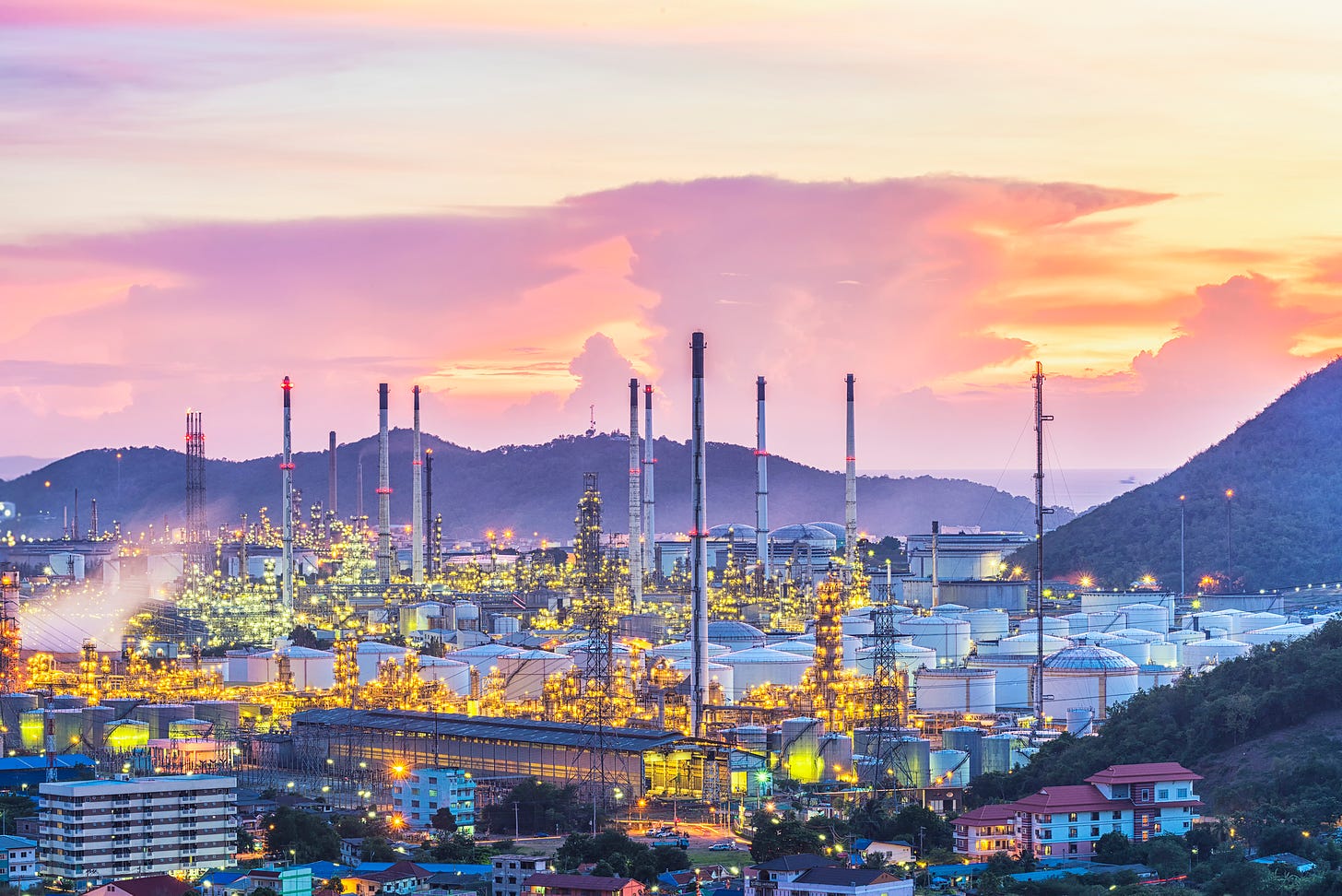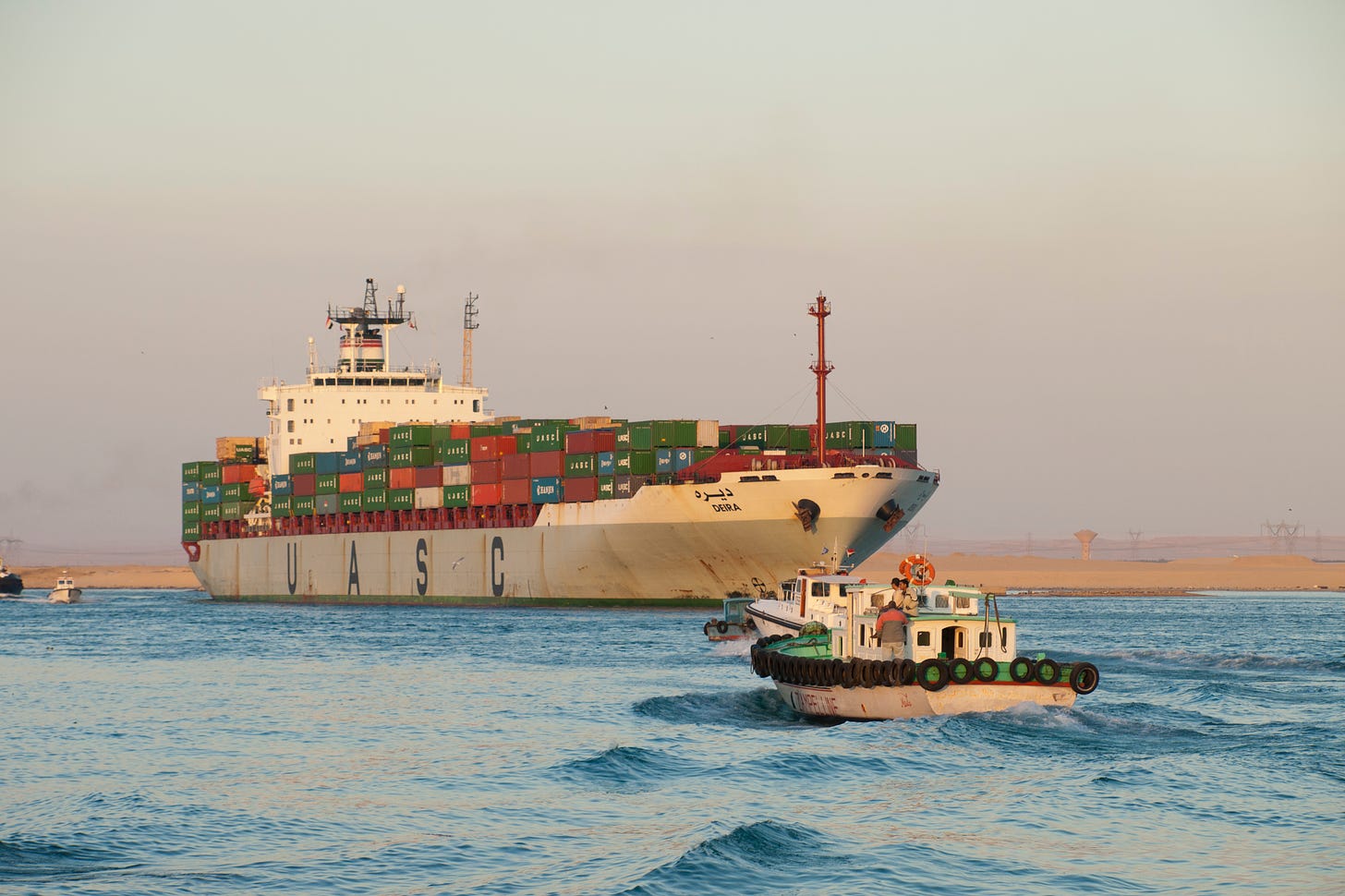Emerging Markets Daily - February 2
OPEC+ To Hike Output Again, China's Rising Iraq Investments, Asset Managers Pile into Brazil Stocks, Bulk Shipping Rates Tumble, Suez Canal Hits Revenue Record
The Top 5 Stories Shaping Emerging Markets from Global Media - February 2
OPEC+ Agrees to Continue Output Hike in March Amid Higher Demand
The National
“Opec and its allies will stay the course and bring 400,000 barrels per day of crude to the market in March amid higher demand as the global economy continues to recover from the coronavirus pandemic and growing supply concerns as a result of geopolitical tensions in eastern Europe.”
“Opec+, a group of oil producers led by Saudi Arabia and Russia, agreed to increase production next month during an online meeting on Wednesday, the group said.”
“Oil prices have rallied to their highest since 2014 on tighter supply, higher demand and production constraints. Brent, the global benchmark for two thirds of the world's oil, was trading at $89.08 per barrel at 8.08pm UAE time on Wednesday. West Texas Intermediate, the gauge that tracks US crude, was trading at $87.99 a barrel.”
“Crude has stayed buoyant in the past few weeks as geopolitical tensions continue to rise in eastern Europe. The Pentagon placed 8,500 US troops on high alert after Russia stationed thousands of troops along the border with Ukraine.”
“Russia further boosted its troop presence over the weekend in a sign of a potential escalation that could derail the flow of global energy supplies. ‘Oil prices around $90 per barrel are a sign of a bullish mood and supply fears,’ said Norbert Rucker, head of economics and next generation research at Julius Baer. ‘The fundamental basis for such frothiness is low storage levels after the past year’s swift economic rebound overwhelmed the energy business in ramping up production in time.’”
“The Ukraine crisis adds to the fears, although the risks of meaningful Russian oil export disruptions appear low, he said. ‘Such nervousness seems to be a characteristic behaviour of ‘peakish’ markets, and there is a possibility for prices to temporarily move even into the triple digits.’”
“Oil prices have rallied more than 10 per cent this year and Brent touched a seven-year high of $91.70 per barrel last week while crude has risen more than 67 per cent in the past year.” Fareed Rahman reports.
See also, our Emerging World Column - Why Petroleum (Still) Matters
China Pours Money Into Iraq Amid Growing Perception That U.S Is Retreating
Financial Times
“Iraq has become one of the biggest beneficiaries of Xi Jinping’s Belt and Road Initiative as China deepens its economic ties across the Middle East through billion-dollar construction and energy contracts.”
“Beijing struck $10.5bn in new construction deals in Iraq last year, part of a ‘strong shift’ in its engagement towards the Middle East despite a broader downturn in Chinese outbound investment.”
“The findings were revealed in a report published on Wednesday by the Green Finance & Development Center at Fudan University in Shanghai and reviewed by the Financial Times.”
“Beijing’s efforts to foster deeper economic ties with Iraq, Opec’s second-largest oil producer, coincides with a growing perception among Arab leaders that the US is disengaging from the Middle East.”
“The researchers noted that the Chinese Ministry of Commerce’s five-year plan to 2025 promised investment overseas, including non-BRI projects, of $550bn, down 25 per cent from $740bn in 2016-2021.”
“But in Middle Eastern and Arab countries, the level of construction investments and contracts rose 360 per cent and 116 per cent, respectively, mostly in energy and transport infrastructure.”
“Christoph Nedopil Wang, director of the Green Finance & Development Center, said the researchers were ‘surprised’ by the extent of China’s engagement with Middle East and Arab states. ‘We believed that the focus would be much more on south-east Asia, including infrastructure,’ he said. ‘But actually it was particularly driven by Iraq . . . and a strong shift towards Africa and Middle Eastern countries.’”
“China has cemented its position in the region in the same year that President Joe Biden formally ended the US combat mission in Iraq and the Taliban retook control of Afghanistan after the chaotic exit of coalition forces.” The Financial Times reports.
BlackRock and T. Rowe Price Buy Up Battered Brazilian Stocks
Bloomberg
“BlackRock Inc. and T. Rowe Price Group Inc. are among global asset managers that have built up their holdings on some Brazilian companies recently after a dismal year for stocks pushed valuations to the lowest in over a decade.”
“BlackRock boosted its stake last month in digital lender Banco Inter SA and Sendas Distribuidora SA, the food retailer known as Assai, while T. Rowe Price increased holdings of retailer Magazine Luiza SA, according to a review of corporate filings.”
“The asset managers joined other foreign investors that piled into Brazilian stocks after the Ibovespa index posted its first annual decline since 2015, making it the world’s second-worst-performing equity benchmark, with stocks hitting 7.4 times forward earnings, the lowest since 2009. Offshore investors poured 32.5 billion reais ($6.2 billion) into Brazilian stocks in January, the second-largest monthly inflow since at least 2008.”
“‘We have been selectively adding to Brazilian equities since the end of last year,’ said Ed Kuczma, who manages over $1 billion in Latin American equities for BlackRock. ‘Brazilian equities are under-owned by global investors, in my opinion, and the current valuations reflect a lot of uncertainty.’”
“Brazilian stocks were hit by several factors last year: anticipation of weaker growth, higher interest rates and election uncertainty, along with pressure from domestic funds that were forced to sell as they struggled with redemptions.” Vinicius Andrade reports.
Bulk Shipping Rates Tumble 90% As China Steel Output Shrinks
Nikkei Asia
“Freight rates for large bulk carriers fell more 90% from last year's peak amid sharply lower demand for iron ore in China, the world's largest steel producer.”
“The capesize spot rate for the largest dry cargo ships dropped to $5,826 per day at the end of January, marking the lowest in 20 months. The plunge in rates, which only four months ago had hit a 12-year high of over $80,000 per day, stands in sharp contrast to the continued high demand for container shipping.”
“The drop in Chinese steelmaking reflects both a slowdown in the overall economy and environmental concerns over blast furnaces. While the capesize spot rate has recovered to about $10,000 per day recently, it remains below the break-even rate for shippers, which is considered around $20,000 per day.”
“The Baltic Exchange's dry bulk sea freight index also fell to 1,296 at one point in January, marking a 13-month low, dragged down by the capesize market. China experienced significant disruption at its ports in mid-2021 owing to a combination of COVID-19 entry restrictions and bad weather, which hampered unloading. That in turn limited the availability of bulk ships and sent prices soaring.”
“But the number of stalled ships waiting off the shores of China has since been reduced by 40%, according to IHS Markit, signaling an easing of capacity constraints.”
“The downward pressure on rates has come from weak shipping demand. China's crude steel production has been unable to top levels of the previous year since last July. According to the World Steel Association, output for 2021 also fell for the first time in six years.” Kazuto Shimada reports.
See Also our Column - The Workhorse of Globalization: The Container Ship
Suez Canal Revenues Hit New Record in January
Egypt Today
“The head of the Suez Canal Authority Osama Rabie, announced on Tuesday that the navigation movement in the vital waterway during January 2022 made unprecedented records.”
“He explained that the figures that were achieved came in terms of the number of ships, net tonnages and the revenues achieved to become the highest compared to the performance rates achieved during the successive months of January throughout the history of the canal.”
“Rabie indicated that the Suez Canal witnessed the crossing of 1774 ships from both directions during January 2022, compared to the crossing of 1594 ships during January 2021, with a total net tonnage of 106.1 million tons, compared to 104.2 million tons during January 2021.”
“He explained that the regularity of navigation movement in the canal had a great impact on increasing the total revenues achieved, as the authority’s revenues during January 2022 recorded about US$ 544.7 million, excluding navigation services, compared to US$ 495.7 million during the same month of last year, an increase of US$ 49 million at 9.9 percent.”
“Rabie added that the navigational reports during January 2022 monitored a significant increase in the transit rates of various types of ships compared to the same month of last year, as the number of bulk vessels increased by 25.1 percent, and container ships transiting the canal increased by 11.5 percent.” Egypt Today reports.
“If your dreams don’t scare you, they are too small.” -Richard Branson






